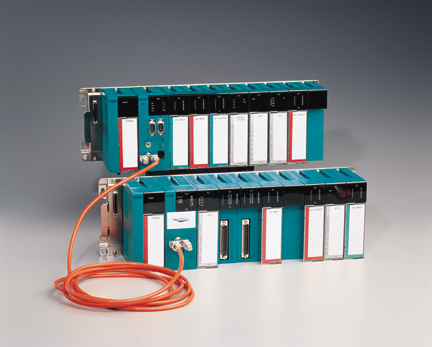SoftPLC in Tealware
SoftPLC in Tealware is an embedded, rack based, open architecture system that includes a controller CPU and a full line of I/O modules for applications ranging from small machine control to complex, multi-vendor distributed systems.
Tealware CPU's embed the SoftPLC Control Software to provide functionality unmatched by any PLC CPU available on the market - yet are priced so that even simpler, smaller applications can benefit.
SoftPLC In Tealware includes a complete line of digital, analog and specialty I/O modules, which can be installed in both local and remote configurations.
A typical SoftPLC Tealware controller system consists of: A CPU base and optional expansion I/O bases
- CPU module with embedded SoftPLC Control Software
- Power supply module
- Various I/O modules
CPU Bases can accommodate the power supply module, CPU module and 4, 6, or 8 I/O modules. return
Configurations:
In a local configuration, expansion I/O bases for 6 or 8 I/O modules are available. You can connect up to 3 expansion bases to any CPU base. The maximum distance from a CPU base to the last expansion base is 30 feet. A local configuration can support up to 1024 I/O points.
In remote configurations we offer two choices:
- SoftPIPE™ provides a 2.5MB remote I/O network connection. You can connect up to 15 remote drops, each consisting of a remote drop base (with Remote I/O Adapter) and up to 3 expansion I/O bases. The maximum distance from the CPU and the last remote drop is 20,000 feet. Remote configurations can support up to 16,384 I/O points.
Additionally, if a non-Tealware CPU is desired (eg: if ISA/PCI slots are needed for add-on cards), a PCI bus Tealware I/O interface card is available that supports PCI remote I/O configurations for systems such as SoftPLC Processors or Hardbook SoftPLC Processors.
- Ethernet Remote I/O provides a Modbus TCP connection to Tealware I/O. Each remote drop can consist of a remote drop base with the Ethernet I/O adapter and up to 3 expansion I/O bases.
In both cases, fiber optic network connections are available via converters, for longer distances or more reliable communications in noisy environments

return